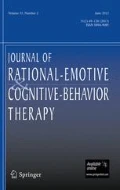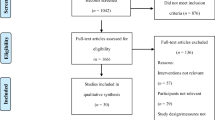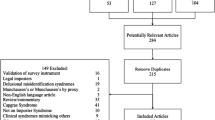Abstract
Personal, work and even client-related burnout are highly predominant among artisans and linked to their stress-related experiences. The present study aimed to ascertain the efficacy of a rational emotive behaviour therapy program in reducing burnout among building construction and mechanical trade artisans, using a randomized controlled trial design. One hundred and twenty-five building construction and mechanical trade artisans randomly assigned to either a treatment intervention or no-intervention group participated in the study. The Copenhagen Burnout Inventory was administered to participants at Time 1 (pretest), Time 2 (posttest), and Time 3 (follow-up). Results of repeated measures analysis of variance demonstrated a significant reduction in mean burnout among artisans in the treatment group after the 10-week REBT program. In contrast, the control group did not experience any significant mean burnout reduction. Furthermore, at follow-up, the mean decrease in burnout score among artisans in the treatment group was significantly maintained. In conclusion, the rational emotive behaviour intervention significantly reduced the burnout score of building construction and mechanical trade artisans and sustained it.


Similar content being viewed by others
References
Adnan, E., Yasmine, E.-R., & Suhair, A. (2015). Job stress, job burnout and safety performance in the Palestinian construction industry. Journal of Financial Management of Property and Construction, 20(2), 170–187. https://doi.org/10.1108/JFMPC-01-2015-0004
Ahola, K., Honkonen, T., Isometsä, E., Kalimo, R., Nykyri, E., Aromaa, A., & Lönnqvist, J. (2005). The relationship between job-related burnout and depressive disorders—Results from the Finnish Health 2000 Study. Journal of Affective Disorders, 88(1), 55–62.
Anggreini, C., Daharnis, D., & Karneli, Y. (2019). The Effectiveness of group rational emotive behavior therapy to reduce student learning burnout. International Journal of Research in Counseling and Education, 3(2), 109–114.
Bakare, J., Omeje, H. O., Yisa, M. A., Orji, C. T., Onyechi, K. C., Eseadi, C., Nwajiuba, C. A., & Anyaegbunam, E. N. (2019). Investigation of burnout syndrome among electrical and building technology undergraduate students in Nigeria. Medicine, 98(42), e17581.
Cheek, J. R., Bradley, L. J., Parr, G., & Lan, W. (2003). Using music therapy techniques to treat teacher burnout. Journal of Mental Health Counseling, 25(3), 204–217.
Cohen, J. (1988). Statistical Power Analysis for the Behavioral Sciences (2nd ed.). NJ Lawrence Erlbaum Associates, Publishers.
Construction Industry Review Committee Hong Kong (2001). Construct for excellence: Report of the construction industry review committee. Hong Kong. Retrieved from https://www.devb.gov.hk/filemanager/en/content_735/reporte.pdf
Creedy, D. K., Sidebotham, M., Gamble, J., Pallant, J., & Fenwick, J. (2017). Prevalence of burnout, depression, anxiety and stress in Australian midwives: a cross-sectional survey. BMC Pregnancy and Childbirth, 17, 13. https://doi.org/10.1186/s12884-016-1212-5
Dainty, A. R., Neale, R. H., & Bagilhole, B. M. (1999). Women’s careers in large construction companies: Expectations unfulfilled? Career Development International, 4(7), 353–358.
David, D. (2014). Rational emotive behavior therapy (REBT). In: The Encyclopedia of Clinical Psychology. Wiley & Sons. https://doi.org/10.1002/9781118625392.wbecp077.
Dryden, W., & Neenan, M. (1995). Dictionary of rational emotive behavior therapy. Whurr.
Ellis, A. (1994). Reason and emotion in psychotherapy (2nd ed.). Birch Lane Press.
Ellis, A. (2000). Rational emotive behavior therapy. In R. J. Corsini & D. Wedding (Eds.), Current psychotherapies (6th ed.). Itasca, IL: Peacock.
Ezenwaji, I. O., Eseadi, C., Ugwoke, S. C., Vita-Agundu, U. C., Edikpa, E., Okeke, F. C., Nwafor, B. N., Ozioko, A. N., Ebinyasi, J. O., & Nwabuko, L. O. (2019). A group-focused rational emotive behavior coaching for management of academic burnout among undergraduate students: Implications for school administrators. Medicine, 98(30), e16352.
Ezeudu, F. O., Attah, F. O., Onah, A. E., Nwangwu, T. L., & Nnadi, E. M. (2020a). Intervention for burnout among postgraduate chemistry education students. Journal of International Medical Research, 48(1), 0300060519866279.
Ezeudu, F. O., Nwoji, I. H. N., Dave-Ugwu, P. O., Abaeme, D. O., Ikegbunna, N. R., Agugu, C. V., Muoneke, M. N., Alabi, A. O., & Nwefuru, B. C. (2020b). Intervention for burnout among chemistry education undergraduates in Nigeria. Journal of International Medical Research, 48(1), 0300060519867832.
Halbesleben, J. R. B., & Demerouti, E. (2005). The construct validity of an alternative measure of burnout: Investigating the English translation of the Oldenburg Burnout Inventory. Work & Stress, 19(3), 208–220. https://doi.org/10.1080/02678370500340728
Hallsten, L., Josephson, M., & Torgén, M. (2005). Performance-based self-esteem: A driving force in burnout processes and its assessment. Arbete Och Hälsa, 4, 1–40.
Ho, A. H. Y., Tan-Ho, G., Ngo, T. A., Ong, G., Chong, P. H., Dignadice, D., & Potash, J. (2019). A novel mindful-compassion art therapy (MCAT) for reducing burnout and promoting resilience for end-of-life care professionals: A waitlist RCT protocol. Trials, 20(1), 406.
Igbokwe, U. L., Onyechi, K. C., Ogbonna, C. S., Eseadi, C., Onwuegbuchulam, A. C., Nwajiuba, C. A., Ugodulunwa, C. C., Eze, A., Omaeze, K., & Patrick, C. P. (2019). Rational emotive intervention for stress management among english education undergraduates: Implications for school curriculum innovation. Medicine, 98(40), e17452.
Kristensen, T. S., Borritz, M., Villadsen, E., & Christensen, K. B. (2005). The Copenhagen Burnout Inventory: A new tool for the assessment of burnout. Work & Stress, 19(3), 192–207.
Lee, W., Migliaccio, G. C., Lin, K.-Y., & Seto, E. Y. (2020). Workforce development: Understanding task-level job demands-resources, burnout, and performance in unskilled construction workers. Safety Science, 123, 104577.
Lingard, H. (2003). The impact of individual and job characteristics on “burnout” among civil engineers in Australia and the implications for employee turnover. Construction Management and Economics, 21(1), 69–80.
Lingard, H., & Francis, V. (2006). Does a supportive work environment moderate the relationship between work-family conflict and burnout among construction professionals? Construction Management and Economics, 24(2), 185–196.
Ng, S. T., Skitmore, R. M., & Leung, T. K. (2005). Manageability of stress among construction project participants. Engineering, Construction and Architectural Management, 12(3), 264–282.
Norlund, S., Reuterwall, C., Höög, J., Janlert, U., & Järvholm, L. S. (2015). Work situation and self-perceived economic situation as predictors of change in burnout–a prospective general population-based cohort study. BMC Public Health, 15(1), 329.
Nwabuko, L. O., Eze, G. C., Eneh, E. C., Okechukwu, A. E., & Udom, I. E. (2019). Effect of rational-emotive adult education intervention on burnout symptoms among primary school teachers in Southeast Nigeria. Journal of International Medical Research 48(4), 300060519882204.
Ogbuanya, T. C., Eseadi, C., Orji, C. T., Omeje, J. C., Anyanwu, J. I., Ugwoke, S. C., & Edeh, N. C. (2018). Effect of rational-emotive behavior therapy program on the symptoms of burnout syndrome among undergraduate electronics work students in Nigeria’. Psychological Reports, 122(1), 4–22.
Onuigbo, L. N., Onyishi, C. N., & Eseadi, C. (2020). Clinical benefits of rational-emotive stress management therapy for job burnout and dysfunctional distress of special education teachers. World Journal of Clinical Cases, 8(12), 2438.
Rotenstein, L. S., Torre, M., Ramos, M. A., Rosales, R. C., Guille, C., Sen, S., & Mata, D. A. (2018). Prevalence of burnout among physicians: A systematic review. JAMA, 320(11), 1131–1150.
Saganha, J. P., Doenitz, C., Greten, T., Efferth, T., & Greten, H. J. (2012). Qigong therapy for physiotherapists suffering from burnout: A preliminary study. Journal of Chinese Integrative Medicine, 10(11), 1233–1239.
Schaufeli, W., & Enzmann, D. (1998). The burnout companion to study and practice: A critical analysis. Boca Raton: CRC Press.
Shirom, A. (2011). Job-related burnout: A review of major research foci and challenges. In J. C. Quick & L. E. Tetrick (Eds.), Handbook of occupational health psychology (pp. 223–241). Washington: American Psychological Association.
Ugwoke, S. C., Eseadi, C., Onuigbo, L. N., Aye, E. N., Akaneme, I. N., Oboegbulem, A. I., Ezenwaji, I. O., Nwobi, A. U., Nwaubani, O. O., & Ezegbe, B. N. (2018). A rational-emotive stress management intervention for reducing job burnout and dysfunctional distress among special education teachers: An effect study. Medicine, 97(17), e0475.
Walter, U., Krugmann, C. S., & Plaumann, M. (2012). Burn-out wirksam prävenieren? Ein systematischer Review zur Effektivität individuumbezogener und kombinierter Ansätze [Preventing burnout? A systematic review of effectiveness of individual and combined approaches]. Bundesgesundheitsblatt Gesundheitsforschung Gesundheitsschutz, 55(2), 172–182.
Yang, F., Li, X., Zhu, Y., Li, Y., & Wu, C. (2017a). Job burnout of construction project managers in China: A cross-sectional analysis. International Journal of Project Management, 35(7), 1272–1287.
Yang, F., Li, X., Zhu, Y., Li, Y., & Wu, C. (2017b). Job burnout of construction project managers n China: A cross-sectional analysis. International Journal of Project Management, 35(7), 1272–1287.
Yip, B., & Rowlinson, S. (2009). Job Burnout among Construction Engineers Working within Consulting and Contracting Organizations. Journal of Management in Engineering, 25(3), 122–130.
Ziegler, D. J. (2003). The concept of psychological health in rational emotive behavior therapy. Journal of Rational-Emotive & Cognitive-Behavior Therapy, 21(1), 21–36.
Author information
Authors and Affiliations
Corresponding author
Ethics declarations
Conflict of interest
The authors declare that they have no conflict of interest.
Additional information
Publisher's Note
Springer Nature remains neutral with regard to jurisdictional claims in published maps and institutional affiliations.
Rights and permissions
About this article
Cite this article
Okereke, G.K.O., Omeje, H.O., Nwaodo, S.I. et al. Reducing Burnout among Building Construction and Mechanical Trade Artisans: The Role of Rational Emotive Behaviour Intervention. J Rat-Emo Cognitive-Behav Ther 40, 61–74 (2022). https://doi.org/10.1007/s10942-021-00399-y
Accepted:
Published:
Issue Date:
DOI: https://doi.org/10.1007/s10942-021-00399-y




